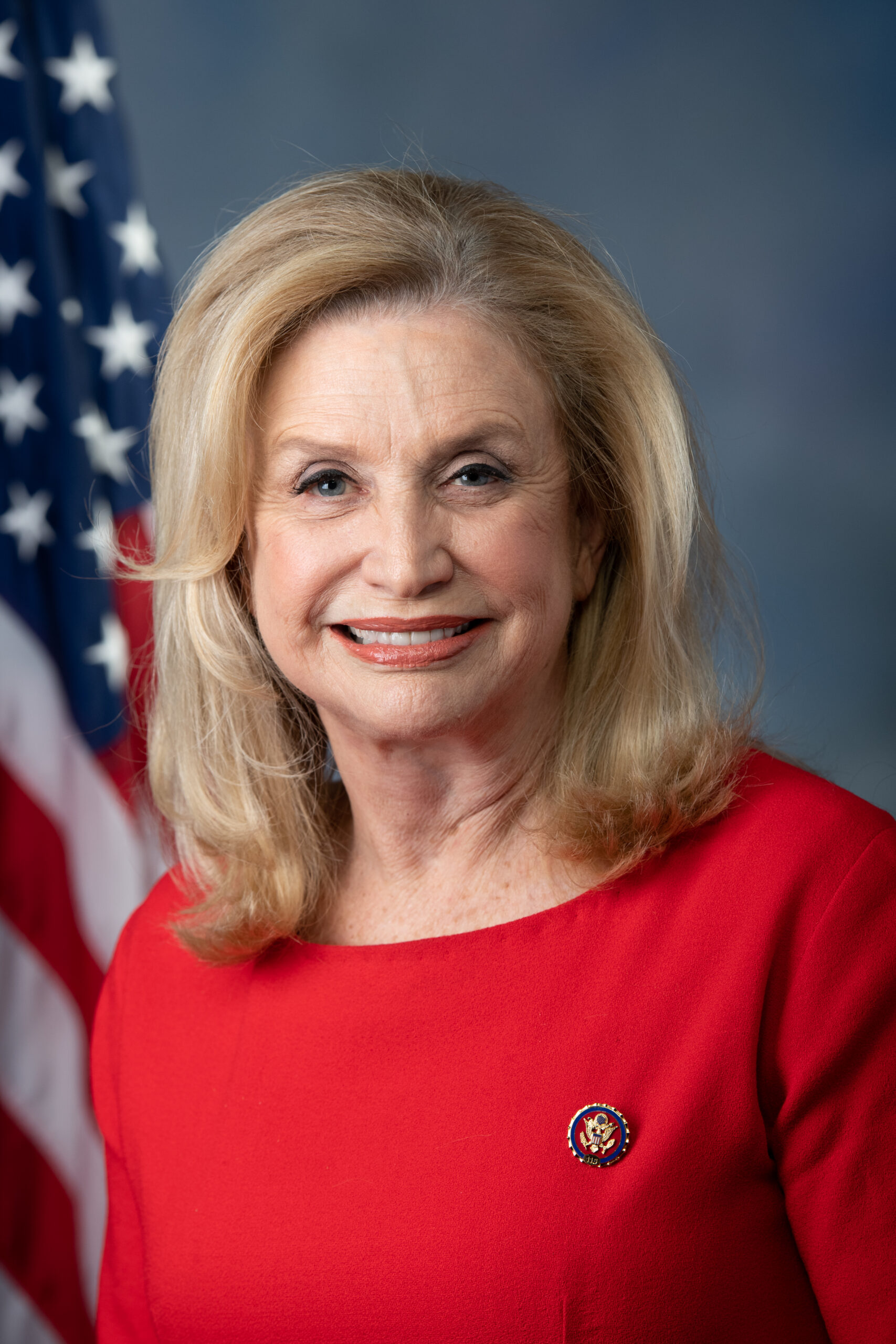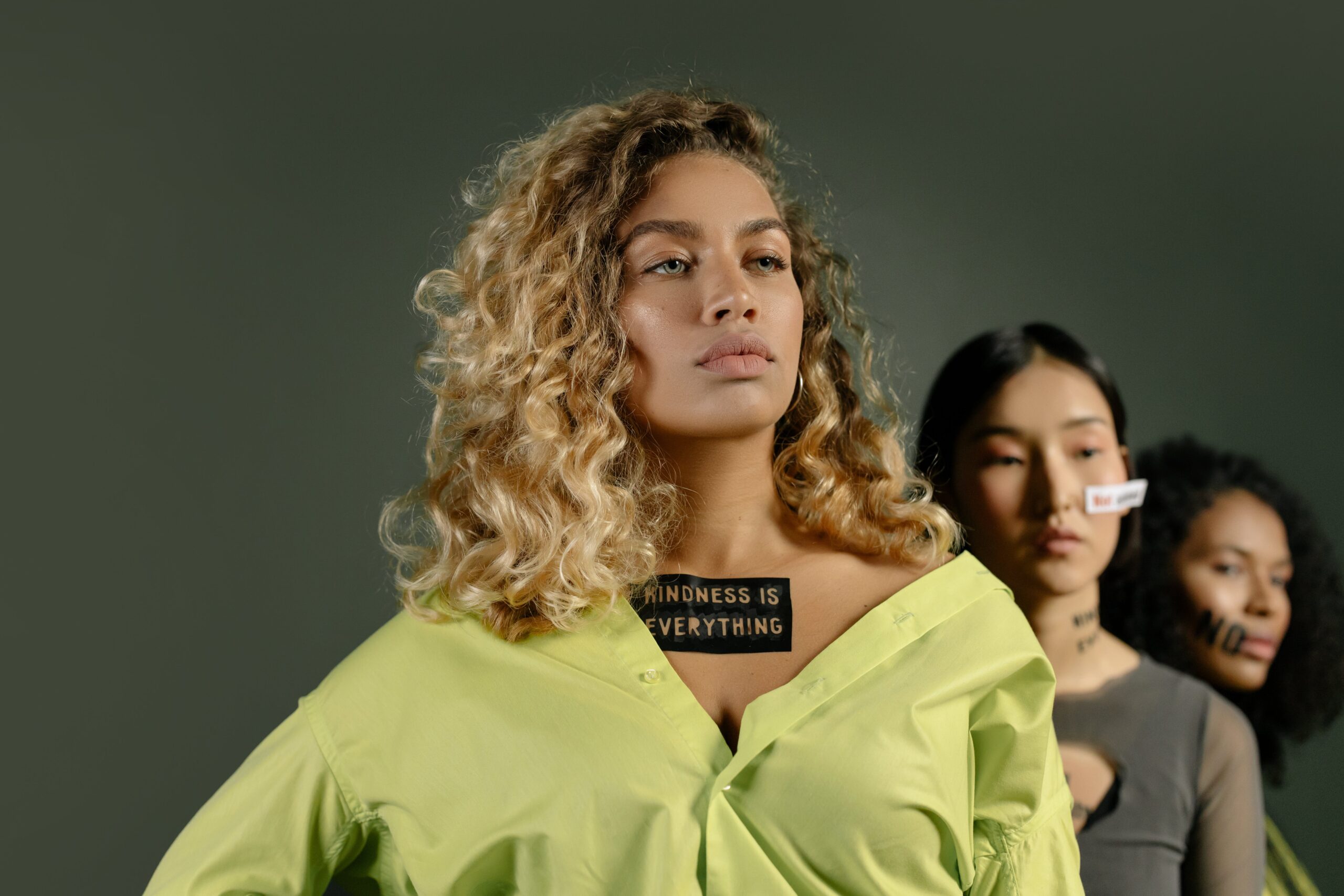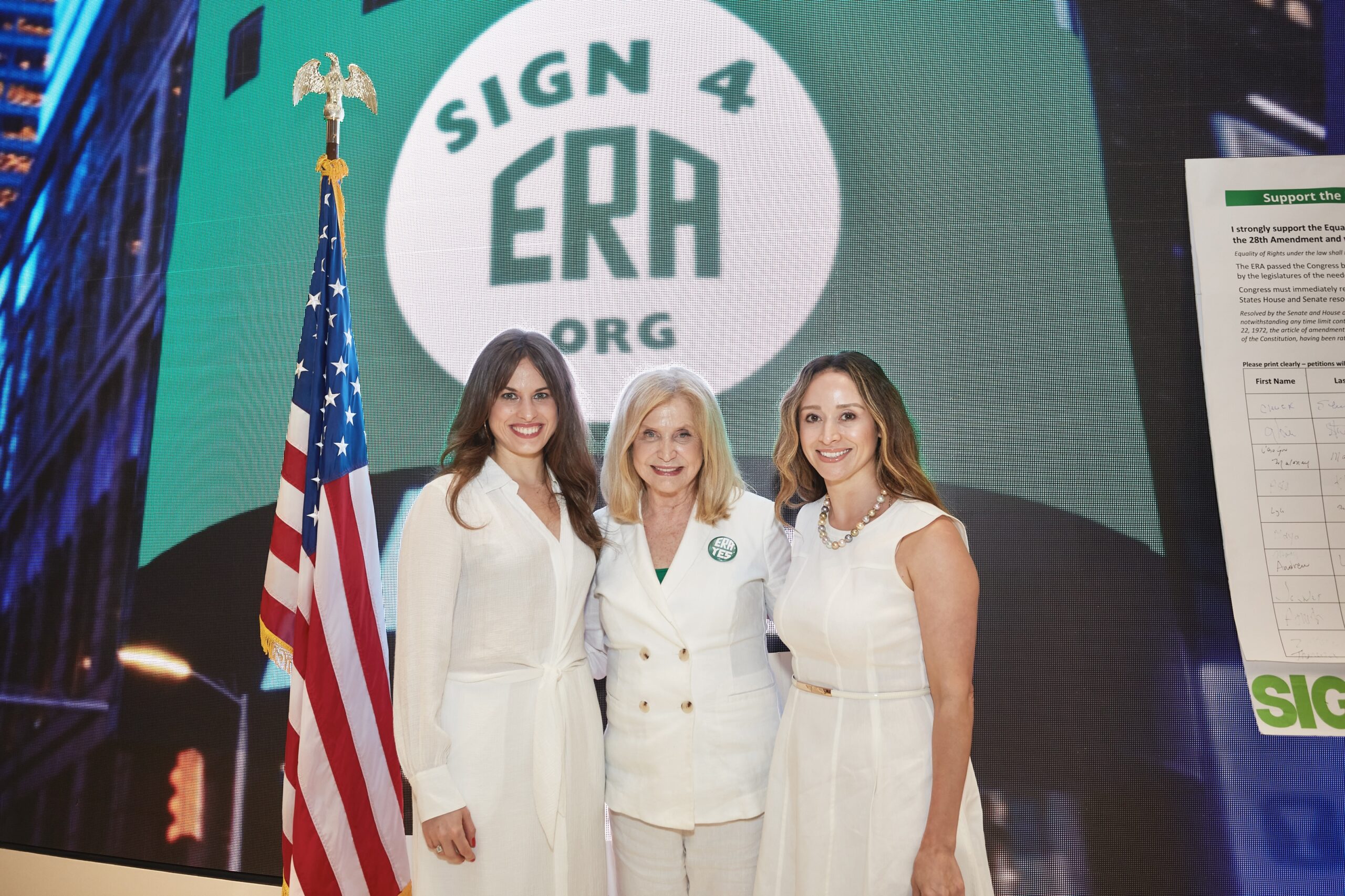We are excited to have former United States Representative, Carolyn Maloney on The Style That Binds Us Podcast today. Congresswoman Maloney was the first woman to represent New York City’s Seventh Council District, where she was the first woman to also give birth in office. She was the first woman to chair the Joint Economic Committee. She became the first woman to chair the House Committee on Oversight and Reform. She was the first to offer a comprehensive package of legislation to make daycare more available and affordable.
She introduced a bill to establish permanent authorization of the September 11th Victim Compensation Fund Act, which was signed into law. She advocated providing Medicare coverage for annual Mammograms.
Congresswoman Maloney has introduced and advocated for legislation regarding issues such as sexual assaults, sex trafficking, women’s rights, and childcare, to name a few. She played a role in getting an American Women’s History Museum on The National Mall and is advocating for the Equal Rights Amendment.
Did you know that women are not included in The Constitution of the United States? It’s time to change that and pave the way for a more equitable future.
The Equal Rights Amendment (ERA) stands as a powerful statement against discrimination based on sex, ensuring that everyone is treated fairly and equally under the law. By showing your support for the ERA, you can play a crucial role in shaping a more inclusive and just society.
Join us in advocating for change and standing up for the rights of women everywhere. Together, we can make a difference and move towards a United States where equality is not just a promise but a reality for all. Take action today and be a part of the movement for progress and equality by signing this petition.
Want to learn about how to become civically engaged and/or how to make a difference/change in your community, city, state or country? Get more information here

Thank you, Congresswoman Maloney, for everything you have done and fought for. Thank you for being here with us today.
Thank you, Delia and Alison, for your podcast. And for inviting me to join you on the very important issue of equal rights for women.
We totally agree. Will you start by walking us through your incredible and inspiring career?
I was born in the conservative South. I was born in Greensboro, North Carolina, and went to school at a school that my mother, my grandmother, and great-grandmother attended Greensboro College. I have deep roots in the South.
My family later moved to Virginia Beach, Virginia and I went to visit New York one day, and I just fell in love with the city. But when I was growing up, I thought the only careers for women because there were no role models and other careers were librarian, secretary, nurse, or teacher.
So I decided to become a teacher. I came to New York, I worked in East Harlem, which is an economically disadvantaged area. The program I was working for, which taught English as a second language, gave high school degrees and high school equivalency degrees lost funding on a state level.
Most programs are funded third by the state, third by the city, and third by the federal government. It lost its state money. My first election in my life, I was about 22 years old. I was elected to represent Harlem, that teaching district at the Board of Education in Livingston Street to help refund the program.
One of the first things we did was we had a lobbying group going to Albany, which I know you’ve done for the Junior League, in your capacity as their public policy leader. We all went up there. I was very successful. I got to see everybody had a strategy.
To make a long story short, I became the lobbyist for the Board of Education, Adult Education, and Welfare Education programs, it was successful, and they achieved their refunding. At that point, they put me in charge of public relations for Adult Programs and Career Education at the Board of Education, but I couldn’t forget how incredible it was to see the power of public policy and elected officials.
Through that experience, I could see that an elected Senator or Assemblyperson had more power than the chancellor in terms of funding and setting policies and standards for education. So I switched, I went to work for the New York State Assembly. I worked for Assemblyman Ed Laner, who was the Chair of the Housing Committee.
Laner was promoted to work for speaker, Stanley Steingut who was succeeded by Stanley Fink, and then later for Manfred Orenstein, the democratic leader of the State Senate. I worked for three of the top leaders of the state before deciding to run for the City Council. I became a sitting member of the City Council, and I went to the City Council I was there for 10 years.
On the City Council, under the Reagan and Bush years, they cut aid to the city of New York by 75%. So all we could do is cut, we’re cutting education and health care. In our system of government, we can challenge things when we don’t like them.
So I challenged a Republican member of Congress who represented the so-called Silk Stocking District, the East Side of New York. I beat him. It was called the biggest upset in the nation. He outspent me four to one and I went off to Congress and served for 30 years.
Recently, I have left Congress because I was defeated in a redistricting battle. I decided, “What can I do that’s just as important as Congress, maybe more important?” Although I passed many bills and was rated continually one of the top three most effective members of Congress, I never was able to recognize women as a part of the Constitution to ratify the Equal Rights Amendment.
I did author and pass a bill creating a Women’s Museum on The Mall because I realized that there were no museums for women. I realized that you can’t empower women unless you recognize them. I think that’s a very important goal.
I now serve on the Board of the Women’s Museum, and we are raising money and moving forward to create that on The Mall. The Mall speaks to our values, they have everything on it except for women. That’s important for advancing women’s rights, I truly believe.
When I left Congress, I became the Chair of the ERA Coalition, which is two hundred ninety groups that are advocating for the passage in recognition of the Equal Rights Amendment. I was also elected the New York State Chair of the National Organization for Women, which is the largest women’s rights organization in the country.
I have recently also been designated the in-house professor, the Eleanor Roosevelt leader in residence at the Roosevelt House Institute of Public Policy, which is where I’m working now. That’s it in a nutshell. It’s part of Hunter College, part of CUNY. That’s where you can reach me here at CUNY Hunter College, Eleanor Roosevelt House.
Really remarkable. We’re so honored that you’re here with us today. I was wondering if you could give our listeners just a quick definition of the ERA.

The Equal Rights Amendment or the so-called, ERA would be enshrined in the United States Constitution. The concept of women’s equality, and create a national legal standard, banning all forms of discrimination in The Supreme Law of the Land. It basically would place women in the Constitution, and it would certainly help us in the enforcement of equal pay for equal rights.
We’ve passed many bills for equal pay, but it’s not enforced because we’re not in the Constitution, it is very important. It would ban all forms of sex discrimination in the supreme law of the land. That’s the definition.
Incredibly, it hasn’t happened. Are there any other issues, you just mentioned, that have arised based on the fact that we are not in the Constitution?
I’d say that the most startling one that we are seeing and why it is so urgently needed now is the Dobbs decision. Our rights are under attack. I call it a “War on women”. Last summer, the Supreme Court in Dobbs vs. Jackson’s Women’s Health overturned the long-established constitutional right to abortion, saying they would only recognize rights explicitly stated in the Constitution.
The undermined decades of Supreme Court decisions, granting women equal protection of the law which is not explicitly guaranteed in the Constitution. The Supreme Court has never interpreted the 14th Amendment, equal protection clause to provide full equality for women. But they are now poised to remove what protections we have.
In short, I never thought, Alison, that my daughters, and dear friends, like Delia, would have fewer rights than you and I had when we were their age. It’s outrageous. Putting the Equal Rights Amendment in the Constitution would create an explicit guarantee of equality without regard to sex, and a guarantee that the court could not deny.
I would say that most of my time in Congress was fighting for the rights we already have as they tried to remove them or roll them back. With the Equal Rights Amendment, we would not be dependent on who’s the head of the Supreme Court, the President, or the head of the legislature. Our rights would be guaranteed.
Sexual violence against women is rampant in American society. One in three women have experienced rape, physical violence, or stalking by an intimate partner in their lifetime. In 2000, the Supreme Court overturned a provision in the Violence Against Women Act that allowed survivors of gender violence to sue their attackers and responsible institutions in federal court.
This was a woman who went to a Virginia school, VMI, and was raped the first night, gang rape, there was no question that she was raped while the rapist even confessed. Yet, when she went to the school, they did nothing. The state city council did nothing, they went to the Supreme Court and threw it out on a technicality.
That women were not in The Constitution. This is a change that protects women from sexual violence. The ERA would give Congress the authority to reenact the Violence Against Women Act, a civil rights remedy for gender violence and economic rights. I think about economic rights, abortion, reproductive rights, and LGBT rights.

Many of the challenges women encounter must be better safeguarded and improved through equal rights.
But on economic rights, when I was in Congress, every year practically, I did a report called, “A New Look through the Glass Ceiling” that looked at women’s pay. It showed that we are paid on average roughly 80 cents to the dollar. When I began working, it was 51 cents to the dollar. We’ve made some progress, but it’s still unfair, and it’s been at 80 cents, 30 years.
For Hispanic women, it’s 59 cents to the dollar, and for African-Americans 63 cents. So over time, it compounds and has a tremendous impact, making women the largest segment of poverty in the United States. Economists believe that women over their lifetime lose between $500,000 and $7 million due to pay discrimination. If other benefits are included, such as bonuses, health insurance, and retirement benefits, for example, these gender compensation gaps increase dramatically.
As a result, women receive smaller Social Security payments after retirement than men. On top of that women experienced high rates of sexual harassment in the workplace and bias for pregnancy and caregiving. So we have for decades, had the Equal Pay Act. But we have not been able to enforce the Pay Act. The Equal Rights Amendment would be a new tool to sue the state and Federal government for sex discrimination in employment and employment, including discrimination against LGBTQI people.
The ERA would give Congress new powers to finally enact legislation, to eradicate workplace discrimination that we’ve made. We’ve had some improvements, I can remember when I first went to work, discrimination was just considered part of the job. But we’ve had other actions, and statements that we’ve tried to work on.
I would say, it’s urgently needed now, mainly because of the Dobbs decision. If we don’t stop them, they’ll keep going at us. It also gives us strict scrutiny at the Supreme Court level, where we’re now at intermediate scrutiny. Our rights are not looked at as seriously as race, religion, and other areas even though we are half the population. So it’s important, that a lot of the challenges that we face with women would be protected and enhanced in their protection by the equal rights of men.
Thank you so much for detailing all of that.
It is bleak. But actually, it’s exciting because Congresswoman Maloney knows what to do. So how can we support the ERA and get it signed into law? What are the best next steps?
I want to give a brief history. The ERA was authored by a prominent suffragist who happens to be a relative of my late husband, Clifton Maloney. She was the first cousin of his grandmother. She was also the head of the National Women’s Party, she was called Alice Paul.
She was the first to introduce the ERA in Congress in 1923, which was a hundred years ago. We all went up to Seneca Falls, where she introduced it at the Presbyterian Church up there, we had hundreds of people from all over the country there to commemorate that. It’s a very simple thing. It said, her original bill said, “Men and women shall have equal rights throughout the United States, in every place, subject to its jurisdiction”.
The Senate changed the language to “Equality of rights under the law, shall not be denied or abridged by the United States or by any state on account of sex.” When the ERA finally passed, it contained this latter language. As we know, Article V of the Constitution had two requirements; that you have a two-thirds vote in the House, two-thirds vote in the Senate, and it’s ratified by thirty-eight states. It was quickly ratified by thirty-five states.
But they added a time limit on it. After three years, Congress extended that time limit, but it was not met, it did not end in 1982, when action on the ERA stopped in the country. In March of 2017, Nevada became the 28th, six state to ratify.
Then Illinois the 37th, and then finally Virginia in 2020 became the 38th state to ratify the Equal Rights Amendment. So right now, what we have is a resolution, that removes the time limit. If Congress can put a time limit down, Congress can remove it. It removes the time limit and recognizes the ERA as ratified.
We have started a petition drive that was announced with Senator Schumer, who also at our request in a petition that I had led before I left Congress, promised to have a vote and a hearing on it. He had the first vote hearing in the Senate in 40 years. It passed, with a majority of thirty-six votes. He’s done a procedural movement that will allow us to have another vote on it in this Congress, and we have worked on showing public support for it.
So we started a Sign4ERA. We’ve started mayors for the ERA If your listeners want to get involved, please have them reach out to their mayors and our website, Sign4ERA.org. We have petition champions who meet every other week to strengthen our movement and get more signatures.
We now have over 72,474 signatures and growing. We must keep working to show the weight of public opinion behind the Equal Rights Amendment. We just had an event at Roosevelt House with the National Organization of Women the Ms. Fund for a Feminist Majority and Ms. Magazine. It was their 50th anniversary and we were having this situation.
We even had a Tennessee State Legislator, Gloria Johnson, who’s now running for the Senate, and she’s been fighting and very vocal on gun safety. So we’re working hard with a petition to make that a reality, too. I hope your listeners will go to Sign4ERA.org and be part of our effort to recognize women in the Constitution.

Oh yes. We are going to include a link to sign the petition and to the Sign4ERA.org website on the blog post and the podcast show notes so that we can make sure that is easily accessible for everyone to sign it because that is important to show that public support. If that got 250,000 signatures, would that make Congress and other legislators pay attention to it?
Absolutely. We’re also using it to communicate with people. It is broken down by congressional districts, so that we can, for example, I was just in North Carolina, at the conference of the Women’s Bar Association.
We have over 3,000 that have signed in North Carolina. We are hoping that the two senators who voted against the ERA will hear from like-minded men and women, change their minds, and vote for women’s equality. We’re using this as a tool to communicate with advocates to respectfully ask their elected officials to recognize the rights of women.
This is all amazing. It is. How do you stay positive in fighting for women’s rights such as equal pay, and other issues when facing such backlash and roadblocks?
Because if you don’t try, you’re not going to win. We have had success. For example, when I walked through the door, there was tremendous discrimination against women.
I remember advertisements saying, “Jobs for men, jobs for women? Women couldn’t serve on juries. They couldn’t get credit in their name.” In some places, they couldn’t even get library cards in their name. Harassment was part of the job. It was sort of, “How do you protect yourself from this constant harassment you were facing?”
So we have had some success. We’re now 80 cents to the dollar. It’s still unfair. That’s why we have two pieces of legislation before Congress now, H.J. Res. 25, headed by Representative Pressley, and S.J. Res. 4 headed by Cardin and the Senate.
The ERA passed in the 70s with something called a Discharge petition. That’s where members of Congress can try to bring something to the floor, even though the leadership is opposed. So in the House, we have Republican leadership, they are opposed.
We’ve done a discharge petition. If we get 218 signatures, we’re now at roughly 200, then it automatically gets sent to the floor for a vote. Once you get it to the floor for the vote, I think everybody’s gonna vote for it. I think it’s hard. In this year 2023, to explain to your constituents, no, I don’t think my daughters and my mother and my sister have equal rights as I have.
You have to remember that we’re just not in The Constitution, we have to change it. This morning, I was reading the statement of the former head of the Joint Chiefs of Staff, Milley. He was talking about, he was resigning from his position as the new chief of staff. He was talking about the importance of our country, a peaceful transfer of power.
He started with the values in our Constitution. He says, “Men and women are created equal.” It’s not what it says. Men are created equal. If you go to the Supreme Court, or you go into courts, you have no standing because women are not in The Constitution, so we need to change that.
I thought it was interesting that he said, “Men and women are created equal”. I know he knows about The Constitution, but I guess he believes that he thinks women should be there too, and I do too. This is long past overdue.
Do you realize that most countries have the Equal Rights Amendment in their literature, and we don’t? I have often wanted to just raise money for a sign that we could put up when people come into our country. I wanted it there for the U.N. when they were there, nearly says, “Welcome to the only democracy in the world that doesn’t include women in The Constitution.” We’ve got to keep thinking of creative ways to get the word out.

Empowering women requires recognizing their importance, which is a central goal for us.
What’s so threatening to treat women and men equally? I would also say that we’re in a much more competitive world than we’re in. When I was growing up, you needed to have a pencil and a sheet of paper when you went to school.
Now you need a computer, you need access to the internet, you need all kinds of computer skills, social media skills, and everything else. But now, it’s a different world. So how can we compete, when, if we’re not developing the talents of all our people to their fullest potential, not just half of our people?
Exactly. Do you have any tips for how we can support women and women’s rights in 2023 and beyond?
I would say you can begin by signing the petition and becoming a petition champion. But find organizations that you believe in, that you want to be part of, volunteer, and become part of civic improvement.
Whatever your choice is, it could be the public library, it could be the school system, it could be all of these organizations, hospitals; they all have volunteer programs to help them. Everybody’s looking for volunteers to work with their causes, and to move forward with them.
Well also, I think about the stigma against, if you said you are a feminist as a woman. A long time ago, I was watching something, it was a period drama on PBS, men were playing golf in their golfing attire, and up over one of the hills came five women in white dresses.
The men looked at each other and said, “Oh no, it’s the suffragettes!” and they threw down their golf clubs and ran. I have never forgotten that. I thought that was so hysterical. That’s one thing I always think about is, that you can, fight the stigma, even among certain people in our generation.
What will people think if you say that you’re a feminist and things like that? But more importantly, are there any pieces of legislation we should know about and push for right now?
Right. How can normal citizens help?
I’d say that the two pieces of legislation we’re pushing are H.J. Res. 25, in the House, and S.J. Res. 4 – Senate Joint Resolution for in the Senate, and the Discharge petition in the House. Encouraging people to see if their legislators are part of it. We do have a website, it’s called Sign4ERA.
It has a list of who’s on it, and who’s off it. You can email and call your legislators and get all your friends to call them, particularly if they’re not sponsoring it. We need them all to be part of the solution. We need them to not only support Congresswoman Presley’s H.J. Res. 25 but also the Discharge petition.
Thank you for that. Any tips on how to get more women in office? What kind of a difference would having more women in office make?
It makes a tremendous difference. The whole time I was in Congress, there were efforts to roll back Roe v. Wade, which passed the House of Representatives. We only had the votes to support Roe v. Wade, the last year that I was in Congress, which was 2022.
That was because we had elected, a third of the Congresswomen and like-minded men, and we had enough votes to pass it. So it makes a tremendous difference. Publicly and in the back room, where many decisions are made.
You need more women in the back room where these decisions are made. We’re having difficulty in getting it through Congress. We’re not a majority in Congress, meaning women. Women generally support women’s issues and fight hard for children and families.
What are some of the biggest lessons you’ve learned throughout your career?
A lot of things that they teach in school are important, but they don’t teach persistence and persuasion. Determination, which turns ideas into success. I would say that it’s the things I didn’t do I regret, never the things I did. So when you have opportunities, grab them, take them.

Our purpose on this Earth is to make our country better for others and be responsible parents, and community members.
One way to pass legislation, I pass a lot of important bills, and I stuck with it. I call it the “Drumbeat of Public Policy”. Where you keep raising information and stories and everything about what you’re trying to do and how you’re trying to make it happen. That’s what I’m doing.
I would say, never let the minor interfere with the major. Certainly, the major is your family – your children, your husband, family, and relatives and community, they’re so important. Always keep that front and center.
I would say the most important thing is, to pray to God to give you a passion. If you have a passion, something that you believe is important that you want to accomplish as I do, I have this Equal Rights Amendment that I’m working on, and it’s giving me purpose and direction, then work is not work.
It’s a passion, it’s a joy, it’s the time and opportunity to make a change and to make the country better. That’s why we’re here on this earth to try to make the country a better place for other people and to be good parents and good citizens in our communities. So those are just a few ideas.
Those are great, really great. How can we use our voices to create change and make our country better for everyone? If we don’t have your platform?
I think you can create your platform, which is what you’re doing with your podcast. You can become a part of other movements as you become, by becoming a petition champion and signing the petition. Find organizations you believe in and support them.
Listen, learn, help, lead. That’s the philosophy of the military. You can put that right into your life, go into any organization, listen, learn, get to help people, and then lead.
That’s great. I feel like some people think that it wouldn’t make a difference. They don’t even know how to reach out to their Congress, or people for their state, will that move the needle if people reach out?
Absolutely. It would move the needle. There’s this quote from Margaret Mead, who was a great environmentalist and humanitarian. She says, “Never believe that a small group of dedicated people can bring change. Indeed, it’s the only way it’s ever been born.”
Even if you look back at the women’s movement, how did it begin? Elizabeth Cady Stanton and Lucretia Mott were at an Abolitionist Movement in England, to abolish slavery. They thought, “Hey, why aren’t we doing things to abolish discrimination against women in our own country?”
They came back and had the first women’s rights convention that began the whole movement that we’re carrying on today. So it was two women who got together and started it. All of us are still working on it. So, a small group of people is the only way that change ever does come.
That’s very encouraging. Yes, it is. Congresswoman Maloney, thank you so much for being here today and thank you for every single thing that you have done your entire career.
Thank you, Delia, and Alison, for this opportunity to share some words and commitment. I look forward to working with you on the ERA and other important causes. Thank you. Thank you for having me.
Of course. Thank you so much.
If you’ve enjoyed this episode, we’d love for you to spread the joy—share it with a friend and hit that subscribe button. Your involvement helps us grow, and we’d be thrilled to have you along for the journey.
EXCLUSIVE CONTENT AWAITS YOU!
Have you heard about our weekly newsletter? It’s your ticket to exclusive content that doesn’t make its way to other platforms. We’re talking behind-the-scenes insights, bonus stories, and much more that’s just for you.
Imagine getting a delightful newsletter drop every Tuesday, except for one special edition on the third Thursday of every month—it’s Alison’s Celebrating Life After 40 edition, a must-read!
Important Links
Connect with Congresswoman Carolyn Maloney
Advocacy
- Equal Rights Amendment (ERA)
- Sign the Petition – Sign4ERA.org
- ERA Coalition
- H.J. Res. 25
- S.J. Res. 4
- Discharge petition
- September 11th Victim Compensation Fund Act
- Medicare Mammograms
- American Women’s History Museum
- National Organization for Women
- LGBTQI
- Women’s Bar Association
Report
People
The Style That Binds Us
BY



you said: